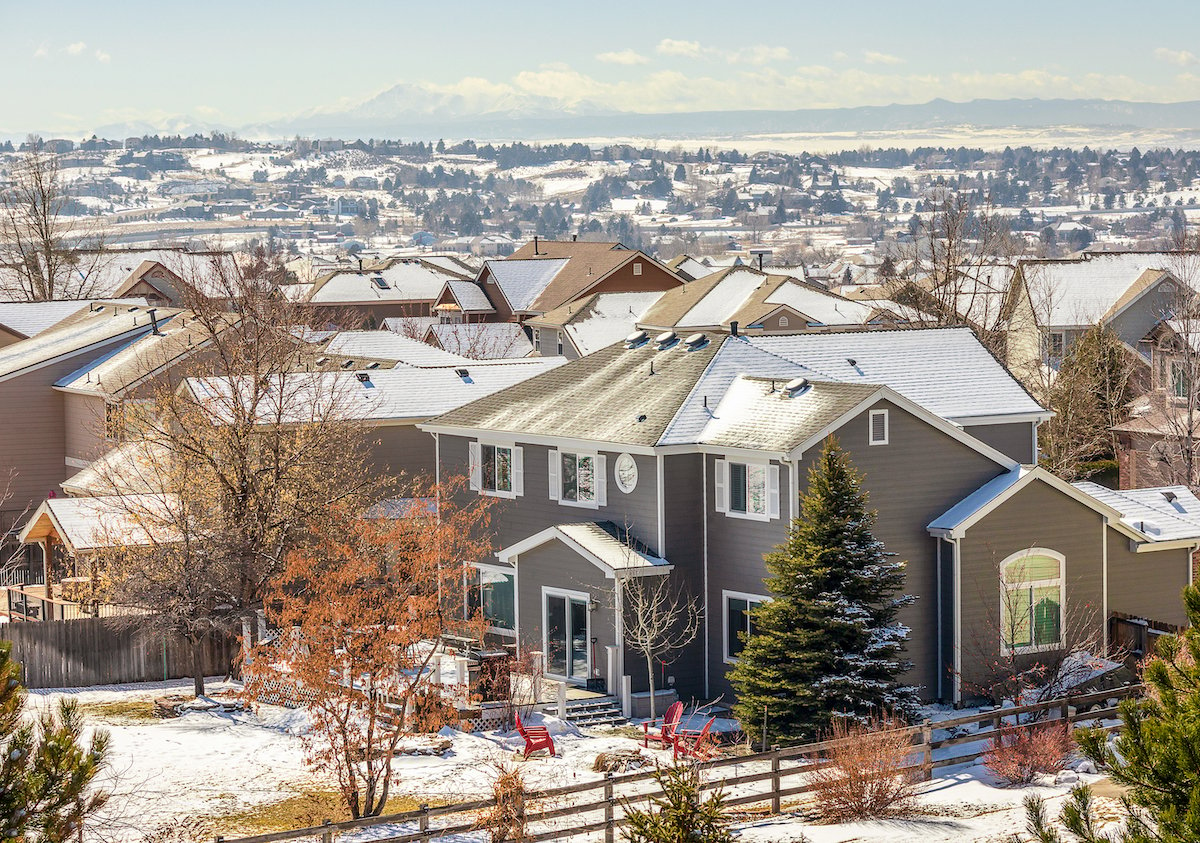Every year, storm-chasing roofers scam thousands, even hundreds of thousands of dollars away from homeowners in Colorado Springs and surrounding El Paso County. Storm-chasers are companies that set up shop here temporarily in order to take advantage of the consistent, stormy weather that we get here every spring and summer. Some of them are here for just a few months, and others hang around for a few years to “ride the wave” of easy storm money.
Secret #1: “It's Not Their Roof”
Many unethical roofers hire "warm bodies" to do their "inspections." These "inspectors" are given little to no training and just told to go out and start knocking on doors. They're told that unless there's obviously no damage, they should advise the owner to call in an insurance claim and basically just see what the insurance adjuster says. Basically they're just "throwing it against the wall to see what sticks," because, as the "inspectors" are told, "It's not your roof, so don't worry about it if the claim is denied."
Why is this a problem for you, as a homeowner? Because if there isn't insurable damage on your roof, you could end up with a Zero-pay claim on your insurance record (also known as a CWOP - a Claim Without Pay). These count as chargeable claims on your record and can have a negative impact on your coverage from your current company. They can even prevent you from getting better insurance coverage from another company.
So... always be wary about the roofer knocking on your door. And remember that it's not his roof, so he isn't going to be as careful with your insurance record as you may want him to be.
Secret #2: The Homeowner Must Sign A Form Before The Inspector Gets On The Roof
This secret is even dirtier than a lot of them (although there is one that is dirtier!). Here's how it happens. The "roofer" will ask you if you want him to inspect your roof. If you say, "Yes, go ahead," he'll present you with a paper and ask you to sign it before he can get on the roof. What does that imply about what it is that he's asking you to sign? That it's some sort of permission authorization or something. The homeowner thinks that he's signing this to give the "roofer" permission to get on the roof. In fact, if you sign this, you may have just signed his contract which states that IF you file a claim and IF an adjuster accepts the claim, you MUST use this "roofer's" company to have the work done. This is a pure intimidation tactic designed to make you feel locked in, because if you say that you will use a different roofer, or use no roofer at all, the "roofing contractor" company will threaten to sue you and charge you hefty fees.
These companies are just bluffing if they threaten to sue you. Don't be intimidated by them. Hopefully you haven't given them any money yet (hint: watch for Dirty Little Secret #6), so they're really not entitled to sue you for anything. The fact is, however, that most people just don't have the grit to stand up to a company which is telling them they will sue. This tactic is designed to be intimidating, and it IS intimidating. So the best thing to do is to not agree to let these "roofers" on your roof.
Secret #3: They Can See Hail Damage On Your Roof From The Street
I received a phone call at home one day from a roofing phone solicitor who told me that her "guy" happened to be driving on my road and noticed that I have hail damage on my roof. This is a funny scenario because I happen to live in the country on a dead-end road where no one drives unless they live here, they're lost, or they're making a delivery. Plus, my house sits 300 feet from the road! But, people who live in the city hear this kind of thing frequently.
"I happened to be driving by and noticed you have hail damage on your roof," a door-to-door roofer might tell you. Doesn't that sound a lot like the asphalt guys who tell you they noticed you have cracks in your driveway? Oftentimes, you will get a roofer who will tell you this in order to get you to allow him to do a roof inspection.
These roofers must have bionic eyes because in all but extreme cases you can't see hail damage on a roof from the ground, much less from the street. Imagine being able to spot a dime-sized, dark spot on a gray shingle while driving past a house at 30 mph from 100 feet away! After the July 28th, 2016 hail storm, when we got baseball-sized hail, you could definitely see damage from the street, but that is an abnormal event and in most cases, hail damage isn't observable unless you're on the roof.
Secret #4: The “Deductible Assistance Program” Or “Referral Reward Program”
This one sounds so nice and so helpful. Hey, a $1,000 deductible can represent a LOT of money for some people. Some homeowners have even higher deductibles. So when a “roofer” tells you that he can waive or rebate or pay all or part of your deductible, that can sound very tempting. The problem is that this is called insurance fraud. It’s illegal in Colorado as of June 6, 2012 (refer to Colorado SB12-038). Some roofers have what they call their “Referral Reward Program,” such that if you give them the name of a neighbor or friend, they'll give you $1,000 or more for that “referral.” That's gaming the system.
This Is How This Works:
To get all the insurance funds sent to the homeowner, but then discount the amount collected for the job, the roofer falsifies his invoice to the insurance company stating what his charge to the homeowner is and then collects less from the homeowner than he stated on his invoice to the insurance company. The problem for the homeowner is that even though it is the roofer falsifying the invoice, the insurance company considers the homeowner to be complicit in the fraud. If they have justifiable reason to believe that this deductible payment is occurring they don't have to pay the costs of the roofer's invoice, thereby putting the homeowner on the hook for out-of-pocket costs he would not normally have had for the roofing project. Think about this: If a roofer is willing to be dishonest regarding this law, just to get a sale for a roofing job, can you trust him to be honest with you?
I'll Admit Something...
There are a lot of roofers who will do this for a homeowner. They'll pay $1,000 for a name of someone, or they'll flat-out give out a check for deductible reimbursement. Homestead Roofing will not do that. We won't offer to pay a deductible in any amount or any form. We don't even pay you for “referrals.” If you refer us to someone, then if we get the job, after that job is done and paid for, we do send you a nice referral gift, but it's not cash or a check. If a homeowner wants a roofer to help him with his deductible, Homestead Roofing is the wrong company to interview for the job. We really do value our clients and hope they truly value the fact that we treat them with honesty and integrity, even though it may be financially to their benefit to hire a different roofer. I hope all of our clients, and the people you may refer to us, know that if we won't game the system in order to get hired to do a job, we won't take advantage of them either. That's why we say that your Homestead Roofing roof is 100% Risk Free.
Secret #5: Have The Owner Pull The Permit
If you ever are approached by a “roofer” who says he needs you to pull the permit, or gives you any excuse whatsoever for why you should pull the permit, you can bet that this is a scam and not a legitimate roofing contractor.
The most probable reason that he would be asking you to do this is because he is not licensed in El Paso County. To be able to pull permits in El Paso County, a roofing contractor needs a recognized, valid license in another jurisdiction that would transfer here, or he must take and pass the Pikes Peak Regional Building Department test and become licensed here.
The license applicant must also demonstrate a history in the roofing industry, either working for another company, or his own. In many cases, the person applying for the license must appear before the county's licensing board and be interviewed.
A lot of "out-of-towners" and "fly-by-nighters" don't want to hassle with all of this. Or they don't want the scrutiny that comes with it, so they come up with stories to convince homeowners that it's better if they pull the permit.
We have encountered several people who have called us about their roofs, and when we do our research we have found out that the roofing contractor who did the previous installation never pulled the permit.
Hopefully after reading this it should be easy to see that a homeowner should never, ever pull the permit for a “roofer.”
Secret #6: Collect A Deposit Up-Front
Just like with roofers paying the deductible, Colorado SB 38 governs this detail, too. Roofers are not allowed to collect money up front from their customers before materials have been delivered to the property. If a check is collected, it must be held in trust by the contractor until materials are on the property. At that time, the check may be deposited into the contractor's account.
The reason for this has been shown in several local news reports where they talk to homeowners who gave a roofer their initial insurance check or their own funds as a material deposit, and then the roofer never showed up to do the work. Many people have been getting ripped off - their deposit money has been taken and then no work was ever performed and no materials were purchased. A couple of years ago, one "roofer" collected over $500,000 and then disappeared! That's why this provision was written into SB38 – to protect homeowners. The problem must be, however, that most homeowners don't know about this law because we still hear stories about homeowners who have signed over their insurance checks prior to any materials arriving at the property or work being done.
The bottom line is that if a roofing contractor wants to collect a deposit payment from a homeowner, he must have delivered the materials first. Or he can demonstrate that materials have been purchased, collect the check, but hold it in trust until the materials are on-site.
Secret #7: We're Fully Insured!
If a “roofer” tells you he’s “fully insured,” do you know what he means by that? Most people will assume that means he has a bunch of insurance to protect himself and maybe protect you, too.
Here’s how the types of insurance carried by roofing contractors will protect you:
- General Liability insurance will protect you if something on or in your property gets damaged. If you have any kind of contractor or service provider on your property who doesn’t have general liability insurance, and he breaks or damages something while he’s there, you will most likely have to pay to repair the damage. Most honest contractors will probably offer to pay for the damage out-of-pocket, but they may not. If not, you’re stuck with the cost.
- Workmen’s comp insurance will protect you if someone gets injured on your property. If the people involved don’t have workmen’s comp insurance and there’s an injury and the injured person decides to call one of the personal injury lawyers that advertises every 15 minutes on day-time television, you could be in BIG trouble because you may be liable for the injury and the associated medical costs.
So What Does My Roofer Mean When He Says He’s “Fully Insured”?
Currently in El Paso County, if a contractor has no employees, he is not required to have workmen’s comp insurance, only general liability insurance. Many, if not most roofing contractors, will use subcontractors as the labor for the various tasks required to re-roof a house. But what about the salesmen and inspectors they use? Believe it or not, to get around the requirement to have workmen’s comp insurance, which is expensive, roofing contractors also make their sales team members sub-contractors, even though, in most cases, they meet the legal requirements to be classified as employees. This enables the roofing company to avoid having to buy expensive insurance and allows them to meet the insurance requirements of Pikes Peak Regional Building Department, and thereby they claim they are “fully” insured.
The best way for you to verify the insurance your contractor has is to ask him to provide you with a copy of his insurance certificate/s for both insurance types. But don't set yourself up to receive fake certificates. You should ask him to have his insurance agent Email or mail you a copy of the certificate with you as the “named holder” on the certificate. This will prevent you from getting any fake insurance certificates.





